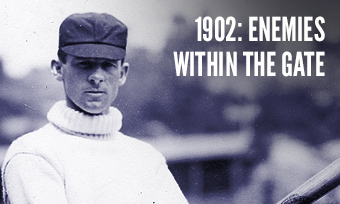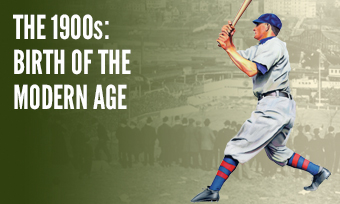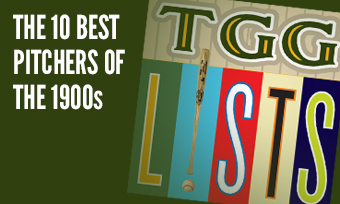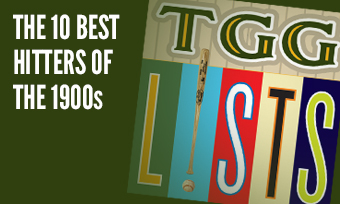The Yearly Reader
Leaders and Honors, 1902
Our list of baseball’s top 10 hitters and pitchers in both the American League and National League for the 1902 baseball season, as well as the awards and honors given to the game’s top achievers of the year.
The National League’s Top 10 Hitters, 1902
Bold type in brick red indicates league leader.
1. Honus Wagner, Pittsburgh
Key Numbers: .330 average, 105 runs, 30 doubles, 16 triples, 91 RBIs, 14 hit-by-pitches, 42 stolen bases.
Hitting for his worst average (.330) of the decade wasn’t enough to ground the Flying Dutchman from his customary spot as the NL’s best.
2. Fred Clarke, Pittsburgh
Key Numbers: .316 average, 103 runs, 14 hit-by-pitches, 29 stolen bases.
The Pirates’ manager-outfielder contributed quite well to his team’s best performance (103-36) under his direction.
3. Ginger Beaumont, Pittsburgh
Key Numbers: .357 average, 100 runs, 193 hits, 33 stolen bases.
Beaumont won his lone batting title (a difficult thing to do even once in the era of Wagner) and led the NL in hits for the first of three straight seasons.
4. Sam Crawford, Cincinnati
Key Numbers: .333 average, 92 runs, 22 triples, 3 home runs, 78 RBIs.
In his final year at Cincinnati before bolting to the AL and a prosperous tenure with Detroit, Crawford led the NL with 22 triples—his first of six such seasons in which the eventual all-time leader in three-baggers would pace the league.
5. Tommy Leach, Pittsburgh
Key Numbers: .278 average, 97 runs, 22 triples, 6 home runs, 85 RBIs.
Leach matched Crawford with 22 triples, but no one else in the NL could equal or top his six home runs; no player has ever led a major league circuit with fewer round-trippers.
6. Jake Beckley, Cincinnati
Key Numbers: .330 average, 5 home runs, 69 RBIs.
A year after he was knocked cold (for more than just a moment) by a Christy Mathewson pitch, the 35-year-old Beckley continued to hit well as if nothing had ever happened…maybe because he didn’t remember it.
7. Fred Tenney, Boston
Key Numbers: .315 average, 88 runs, 73 walks, 29 sacrifice hits, 21 stolen bases.
After flourishing in the 1890s and then tottering at the turn of the century, Tenney enjoyed a comeback campaign at the plate.
8. Willie Keeler, Brooklyn
Key Numbers: .333 average, 86 runs, 186 hits, 19 stolen bases.
One of the great contact hitters of the game continued to be a nuisance, even if he didn’t reach 200 hits for the first time in eight years.
9. Heinie Peitz, Cincinnati
Key Numbers: 112 games, .315 average, 22 doubles.
Never an everyday player, Peitz made the most of the career-high 112 games he would log.
10. Duff Cooley, Boston
Key Numbers: .296 average, 26 doubles, 27 stolen bases.
A once promising table-setter for the Phillies in the late 1890s, Cooley began a brief two-year renaissance with the Beaneaters.
The American League’s Top 10 Hitters, 1902
1. Ed Delahanty, Washington
Key Numbers: .376 average, 103 runs, 43 doubles, 10 home runs, 93 RBIs.
The 34-year-old veteran, who batted over .400 three times in the 1890s, spent his first year in Washington wishing he was playing in New York; despite that and other personal problems, he dominated the AL.
2. Charlie Hickman, Boston-Cleveland
Key Numbers: .361 average, 193 hits, 36 doubles, 11 home runs, 110 RBIs.
Hickman would enjoy the first and finest of many seasons in which he would play for multiple teams, especially thriving at Cleveland—where he hit .378 in 102 games.
3. Buck Freeman, Boston
Key Numbers: .309 average, 38 doubles, 19 triples, 11 home runs, 121 RBIs.
One of the few major leaguers who insisted on offseason weight training, Freeman continued to show off his muscles as one of the AL’s early sluggers.
4. Bill Bradley, Cleveland
Key Numbers: .340 average, 104 runs, 187 hits, 39 doubles, 11 home runs, 77 RBIs.
The Cleveland native benefitted from the midseason arrivals of Hickman (above) and Nap Lajoie (below), leading to career highs in almost every major offensive category.
5. Lave Cross, Philadelphia
Key Numbers: .342 average, 191 hits, 39 doubles, 0 home runs, 108 RBIs.
At the spry age of 36, Cross set a still-standing record by knocking in 108 runs without the benefit of a single home run.
6. Socks Seybold, Philadelphia
Key Numbers: .316 average, 16 home runs, 97 RBIs.
Unlike Cross, Seybold did round the bases on his own—16 times, the most homers by any AL player during the 1900s—but still knocked in 11 fewer runs.
7. Nap Lajoie, Philadelphia-Cleveland
Key Numbers: 95 games, .378 average, 81 runs, 35 doubles, 7 home runs, 65 RBIs.
Lajoie’s follow-up to his superb 1901 numbers was legally obstructed by Pennsylvania courts, but he did his best to make up for lost time once freed in Cleveland.
8. Bill Keister, Washington
Key Numbers: .300 average, 33 doubles, 9 home runs, 90 RBIs.
Playing for what would be his fifth out of six teams over a six-year period, the all-hit, no-glove Keister remained consistent in one facet, once again hitting at or over .300.
9. Jimmy Williams, Boston
Key Numbers: .313 average, 27 doubles, 21 triples, 8 home runs, 83 RBIs.
One of the few players to hang around through the Orioles’ midseason collapse, Williams collected 21 triples for the second straight year.
10. Topsy Hartsel, Philadelphia
Key Numbers: .283 average, 109 runs, 87 walks, 47 stolen bases.
After establishing himself as a prime everyday presence with the Orphans (Cubs) in 1901, Hartsel took his act to the AL and proved he was no one-shot wonder.
The National League’s Top 10 Pitchers, 1902
1. Jack Taylor, Chicago
Key Numbers: 1.29 ERA, 23 wins, 11 losses, 8 shutouts, 333.2 innings.
Pitching well enough not to be seduced by gamblers—yet—Taylor secured his lone ERA crown and started a remarkable string of five straight seasons in which he completed every game he started.
2. Noodles Hahn, Cincinnati
Key Numbers: 1.77 ERA, 23 wins, 12 losses, 321 innings.
Hahn remained the saving grace of an ace, logging over 300 innings for the fourth straight year, producing a career-low ERA and giving an otherwise weak Reds rotation some solidity.
3. Jesse Tannehill, Pittsburgh
Key Numbers: 1.95 ERA, 20 wins, 6 losses.
A year before bolting to the AL, Tannehill was the stingiest of three 20-game winners for the Pirates, authoring a team-best ERA.
4. Jack Chesbro, Pittsburgh
Key Numbers: 2.17 ERA, 28 wins, 6 losses, 8 shutouts, .824 win percentage, 286.1 innings.
Happy Jack surely lived up to his nickname as everything went his way on the mound—before joining Tannehill in New York with the AL’s Highlanders.
5. Deacon Phillippe, Pittsburgh
Key Numbers: 2.05 ERA, 20 wins, 9 losses, 272 innings, 26 walks.
Phillippe was never finer, posting a career-low ERA while allowing less than one walk per nine innings pitched.
6. Vic Willis, Boston
Key Numbers: 2.27 ERA, 27 wins, 20 losses, 51 games, 46 starts, 45 complete games, 410 innings.
Willis was one of two Boston pitchers to extensively labor and make up for the rest of a weak and short-handed pitching staff.
7. Togie Pittinger, Boston
Key Numbers: 2.52 ERA, 27 wins, 16 losses, 389.1 innings.
The 30-year-old right-hander was Boston’s other workhorse, giving the Beaneaters a combined 800 innings, 81 starts and 54 wins between he and Willis; the rest of the staff grouped for 460, 43 and 19, respectively.
8. Joe McGinnity, New York
Key Numbers: 2.06 ERA, 8 wins, 8 losses.
Despite not showing up at the Polo Grounds until mid-July, McGinnity still was productive and efficient enough to make the list; between the Giants and Orioles, he won 21 games and tossed 351.2 innings.
9. Sam Leever, Pittsburgh
Key Numbers: 2.39 ERA, 15 wins, 7 losses.
Leever did not join Chesbro, Tannehill and Phillippe in the land of 20 wins, but was effective nevertheless.
10. Doc Newton, Brooklyn
Key Numbers: 2.42 ERA, 15 wins, 14 losses, 264.1 innings.
A strong showing for a pitcher who would move west and win 74 games (including the Pacific Coast League’s first no-hitter) from 1903-04 before returning to the majors and the AL in 1905.
The American League’s Top 10 Pitchers, 1902
1. Cy Young, Boston
Key Numbers: 2.15 ERA, 32 wins, 11 losses, 45 games, 43 starts, 384.2 innings.
In forging yet another sizzling season for Boston, Young completed 41 of his 43 starts—but he didn’t make it past the first inning in the other two.
2. Rube Waddell, Philadelphia
Key Numbers: 2.05 ERA, 24 wins, 7 losses, 276.1 innings, 210 strikeouts.
What’s amazing about the late-arriving Waddell is that he didn’t even pick up his first of 24 wins until July .
3. Bill Bernhard, Philadelphia-Cleveland
Key Numbers: 2.15 ERA, 18 wins, 5 losses, .783 win percentage.
Despite the distractions of the Pennsylvania courts, Bill Bernhard’s escape from Philadelphia to Cleveland apparently had no effect on his performance.
4. Red Donahue, St. Louis
Key Numbers: 2.76 ERA, 22 wins, 11 losses, 316.1 innings.
Donahue’s return to St. Louis was far more successful than his previous campaign there, in 1897—when he finished 10-35 with a 6.13 ERA for the NL Browns.
5. Ed Siever, Detroit
Key Numbers: 1.91 ERA, 8 wins, 11 losses.
On the seventh-place Tigers, not one pitcher put together a winning record—not even Siever, despite winning the AL ERA crown.
6. Bill Dinneen, Boston
Key Numbers: 2.92 ERA, 21 wins, 21 losses, 39 complete games, 371.1 innings.
The right-hander and Cy Young’s right-handed man nearly matched the star ace in complete games and innings.
7. Addie Joss, Cleveland
Key Numbers: 2.77 ERA, 17 wins, 13 losses, 269.1 innings.
The man who would ultimately furnish baseball’s second-best career ERA introduced himself to the majors by throwing a one-hitter in his first start—and nearly tossed a no-hitter in his second.
8. Jack Powell, St. Louis
Key Numbers: 3.21 ERA, 22 wins, 17 losses, 328.1 innings.
Powell welcomed the Browns from Milwaukee by joining them—and joined Red Donahue (above) as the first two 20-game winners in Browns history.
9. Ned Garvin, Chicago
Key Numbers: 2.21 ERA, 10 wins, 10 losses.
After going 8-20 for Milwaukee in 1901, Garvin eschewed the franchise’s move to St. Louis and joined the White Sox—with more satisfying results.
10. Eddie Plank, Philadelphia
Key Numbers: 3.30 ERA, 20 wins, 15 losses, 300 innings.
Steady Eddie delivered the first of eight 20-win efforts as a major leaguer—his last of which would come in 1915 as a member of the Federal League’s St. Louis Terriers.









